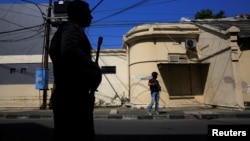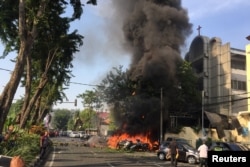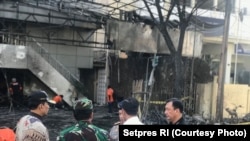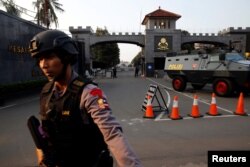A suicide bomb at a police station in the Indonesian city of Surabaya has injured at least 10 people so far. It comes just one day after three coordinated suicide bombings at three churches in the same city, and just six days after a 36-hour prison standoff in a Jakarta suburb where militant prisoners killed five police officers.
Both attacks were perpetrated by families: the church bombings by a family of six, all of whom died, and the police station bombing by a family of five, from which an eight-year-old girl has survived. The church incident was the first time a woman and children have been actively involved in a deadly terrorist attack in Indonesia.
The week of terror incidents has rattled Indonesia, the world’s largest Muslim-majority country, which otherwise has a fairly low per-capita rate of jihadism and runs extensive counter-extremism efforts.
President Joko “Jokowi” Widodo urged the Indonesian House of Representatives to quickly pass a revised draft of the national counterterrorism bill so that police and intelligence would be more empowered to take on suspected terrorists.
Experts say they are a sign of the evolving profile of jihadists in Indonesia, particularly the recent generation of those who are sympathetic to the so-called Islamic State (IS), as opposed to al-Qaida, which has also developed extensive terror networks in Southeast Asia.
Family bombing
“What’s seemingly unusual about the [church] attacks is the involvement of a mother and her children,” said Judith Jacob, who studies Salafi jihadism at the London School of Economics. She said that family links between men are very common in the organizational structure of Jemaah Islamiyah, the Southeast Asian affiliate of al-Qaida, which was responsible for incidents like the 2002 Bali bombing. “[But] women have historically played a more passive role in the group’s organization… not necessarily participating in frontline activity.”
Jacob said that one major difference between the central leadership of al-Qaida and IS is that the latter encourages women to actively engage with militant activity. Last year, Indonesia’s first attempted female suicide bomber, Dian Yulia Novi, was arrested and jailed, but this is the first time that women have actually executed an attack.
A mother and two daughters (aged nine and 12) targeted one church in Surabaya, her two sons (aged 16 and 18) went to a second, and her husband blew himself up at the third. At least thirteen people have died from those attacks and the Islamic State claimed responsibility after the fact through its Amaq news agency.
Indonesian police said that the family belonged to an IS-inspired domestic network called Jemaah Ansharut Daulah.
Initial reports suggested that they themselves actually returned from the so-called Islamic State in Syria, but further investigation with the family's neighbors showed that they had never been to the Middle East and seemingly displayed no signs of radicalization.
Inadequate response
President Jokowi has threatened to issue his own perppu, or presidential decree, on counterterrorism if the House of Representatives does not pass the revised bill imminently. As it stands, argues Jokowi, not much can be done in the face of suspected terrorists, and the burden of evidence may be too high for police and intelligence to deal with prospective militants.
The prison standoff last week “will put added pressure on the government for prison reform,” said Zachary Abuza, a Southeast Asian security expert at the National War College.
Abuza said that this incident was actually the second riot at the exact same prison in Depok, a Jakarta suburb. He visited Indonesia earlier this year and witnessed a similar riot from militant prisoners that he said “went more or less unreported.” “That should have been a wake-up call,” he said.
The prisoners have been moved to a facility in Nusa Kambongan, an island off the Central Java coast, but there remains no standalone, maximum security prison for high-risk jihadist inmates, said Abuza.
Sidney Jones, a leading extremism expert who runs the Institute for Policy Analysis of Conflict, said the concentration of terrorism suspects in Depok has been “a disaster waiting to happen.”
As early as 2016, an IPAC report warned, “The obstacles to effective prison management remain overwhelming… Prisons are overcrowded and understaffed, corruption is rife, and inadequate budgets make it easier for well-funded extremists to recruit inmates when they can offer extra food. No deradicalization program is going to be effective unless some of these issues are addressed.”
At the same time, Abuza said this week’s events may not necessarily reflect a big-picture rise in Indonesians’ sympathies for the Islamic State, since they were carried out by deportees and already-convicted prisoners.
“I don’t think ISIS is necessarily still appealing to a new generation of Indonesians,” said Abuza. “I'm actually more concerned by al-Qaida… their social networks, madrasas [Islamic schools], and mosques are still up… they've been given a lot of space, in what Indonesian police consider a tactical cease-fire. So I still think that is the biggest latent threat.”









